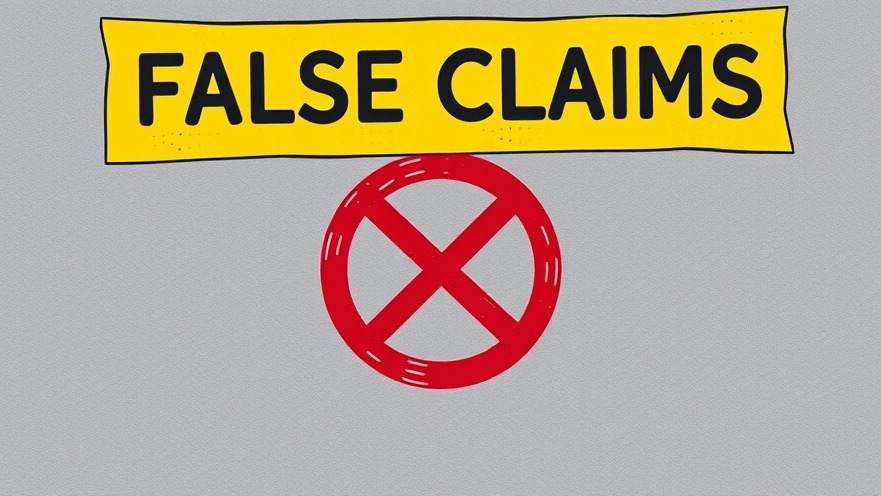
Understanding the Risks of False Claims in Auto Repair
As auto repair shop owners, you navigate a complex landscape where trust and reputation significantly influence customer decisions. In this competitive market, one careless remark or exaggerated claim about a competitor could lead to legal ramifications. In essence, businesses must be meticulous with the facts they present, as misleading statements can transform into liabilities and summon severe consequences.
Defining False Claims: What Should You Watch For?
False claims can take various forms and are not merely outright lies. A false claim is any statement that misrepresents or distorts facts. For instance, if a local shop falsely claims that their competitor's services are subpar or that their products are dangerous without proof, these assertions can lead to serious repercussions.
Merely claiming superiority in service quality without evidence isn't necessarily illegal, but making definitive disparaging claims about competitors can support a lawsuit. As auto repair shop owners, it’s crucial to understand that marketing exaggerations can quickly transition into misleading advertising.
The Protections Under the False Claims Act
The False Claims Act (FCA) is designed to combat fraud against federal programs and has become vital for enforcing adherence among businesses that handle public funds, like Medicaid and Medicare providers. Although primarily directed at healthcare, its principles extend to any industry, including auto repairs, especially if dealing with government contracts.
Penalties for violating the FCA can be severe, with fines imposed for each false claim made or each misleading advertisement. Notably, whistleblowers can also play a role in reporting fraudulent claims, highlighting the importance of maintaining honesty in business practices.
The Thin Line Between Puffery and False Advertising
Distinguishing between creative marketing and false advertisement can be tricky. Statements like "best auto repair service in town" may constitute puffery — subjective opinions not deemed illegal or damaging. However, claims implying that a competitor employs unsafe practices or uses substandard parts can swiftly cross ethical boundaries and may lead to lawsuits.
Examples of dangerous claims include misleading service comparisons, deceptive pricing tactics, or other unsupported allegations that could mislead customers. For auto repair shops, maintaining integrity is crucial, as a single false statement can unravel positive reputations built over years.
The Community Impact of False Claims
Unsubstantiated claims can sway public opinion not just against the competitor but can create a ripple effect across the community. Trust is essential in the service industry. A negative narrative can deter potential customers from visiting any shop in the area, emphasizing the profound impact of ethical advertising on community relationships.
Future Trends: Transparency in Advertising
As consumers become increasingly aware and cautious about marketing lies, transparency will be the new standard for successful advertising. Auto repair shops that provide honest reviews, detailed service plans, and factual comparisons will likely attract customers over those relying on deceptive claims. The shift toward truthfulness in advertising will promote more sustainable business practices and stronger customer loyalty.
What You Can Do: Emphasizing Ethical Marketing
There are numerous strategies to safeguard your business from potential legal issues stemming from false claims. Firstly, ensure all advertising campaigns are factual and transparent. Highlight your unique qualities and strengths while steering clear of negative language regarding competitors.
Additionally, consider seeking legal advice regarding your marketing strategies. Implementing clear guidelines within your organization on advertising practices can prevent unintentional misrepresentation and foster a culture of integrity and respect.
Final Thoughts: Build Trust with Transparency
For auto repair shop owners, maintaining a balance between effective marketing and ethical communication is delicate yet essential. By embracing transparency and honesty in your messaging, you can build stronger reputations, develop customer loyalty, and ultimately drive success.
If you’re ready to enhance your advertising practices while safeguarding against potential legal pitfalls, consult with experts in marketing and legal compliance today. Taking proactive steps will protect you and ensure a reputable standing within the auto repair industry.
 Add Row
Add Row  Add
Add 




 Add Row
Add Row  Add
Add 

Write A Comment